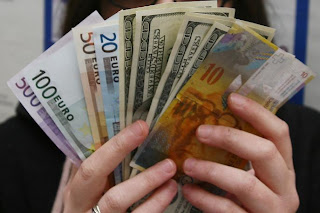The FOREX market is a cash inter-bank or inter-dealer market that became more and more popular after 1971 when exchange rates were first allowed to float freely. Since then trading volume has increased rapidly over time. Today the Foreign Exchange market is the largest financial market in the world with an estimated daily turnover of over $1.5 trillion; more than three times the aggregate amount of the United States Equity and Treasury markets combined.
Unlike other financial markets, the FOREX market has no physical location, no central exchange. It operates through an electronic network of banks, corporations and individuals trading one currency for another. This lack of a physical exchange enables the FOREX market to operate on a 24-hour basis, moving from one time zone to the next, across each of the world?s major financial centres every day.
The objective of currency trading is to exchange one currency for another in the expectation that the market rate or price will change so that the currency you bought has increased its value relative to the one you sold. If you have bought a currency and the price appreciates in value, the trader must sell the currency back in order to close the position, and hopefully to realise the profit.
Through Blue Index the individual trader can trade on the same terms as the major institutions, with inter-bank spreads regardless of trade size.
Trade on Margin
Most FX trades are done on margin. With margin trading, as with other CFD types, you do not have to pay the full value of the shares, instead you put up a deposit (margin) which, with FX, is normally between 5% - 1% of the full contract value. The deposit (margin) required will depend on the liquidity of the particular currency pair.
The contract is revalued at the close of business each day and any resulting margin calls are made. Alternatively, any profit as a result of the revaluation is paid to the client. These monies are credited or debited daily to your margin account.
While your position remains open, your account is debited or credited to reflect interest adjustments. If you are long you pay interest, if you are short you receive interest.
Unlike cash equities and spread betting, FOREX contracts (Rolling Spot Contracts) have no settlement period and you can keep the position open indefinitely, providing there is enough margin in your account to support the position.
Transaction Types
Trading FOREX is very similar to trading other forms of CFDs, there are a number of different ways to trade Foreign Exchange.
Spot
This is the most common Foreign Exchange transaction that describes a deal that will come to settlement in two days, this is then rolled forward at no extra cost to generate a Rolling Spot Contract that has no expiry date. Entering into an FX trade means that you are taking a decision on the relative value of one currency versus another, and whether those currencies will appreciate, depreciate or remain constant against each other.
Forward Outright
A commitment to buy or sell a currency for delivery on a specified future date or period following the spot delivery date. The price is quoted as the Spot rate minus or plus the forward points for the chosen period. The standard periods are 1 and 2 weeks, 1,2,3,6, and 12 months.
Broken Date Forward
A forward deal with a non-standard maturity. Forward contracts are normally based on standard quoted periods, such as one, two or three months forward. A forward contract with a maturity date in, say, seven weeks would be termed a 'broken date' contract. Terms also used include odd dates or broken period.
Option
A contract giving the right but not the obligation to buy (call) or to sell (put) a specified amount of an instrument at a specified price within a predetermined time period. Traditionally, options were used to offset the risk of an underlying instrument. However, today many investors use Options to establish positions in the FX market. A Naked Option is an Option written by the client when s/he does not hold an FX position against it.
